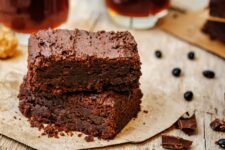The end of the year is full of holidays, celebrations, and time with loved ones. With this can come busy schedules, the stress of planning events, and a plethora of holiday treats.

It can be challenging to stick with your health goals during this time, which may leave you feeling ready for a reset come the new year. Though it can be tempting to restrict all your favorite holiday treats, this approach can often backfire and lead to overeating.
Finding balance during the holiday season is possible if you practice a few key tips, like eating mindfully, planning ahead, and not overly restricting yourself.
Continue reading to learn the most effective tips for eating healthy over the holidays from a registered dietitian.
Top 9 Tips for Balanced Holiday Eating
If you find yourself in a pattern each holiday season of overindulging on sweets and other foods that only come around once a year, you’re not alone.
Practicing these simple tips will help you approach holiday eating in a balanced and mindful way, leaving you feeling your best.
1. Plan Ahead
The first step is to set realistic goals going into the holiday season. Think about what helps you feel your best, whether that’s home-cooked meals, regular walks, or getting good sleep.
Allow for flexibility in your health goals, knowing that this is a busy time of the year and you likely won’t have your regular schedule.
For example, perhaps you make a commitment to look at your calendar each week and plan to cook at home on the days you don’t have social gatherings.
2. Eat Mindfully
Mindful eating is the art of slowing down and paying attention to what your body is telling you before, during, and after eating (1). You can practice this by honoring your natural hunger and fullness cues during the holidays.
Focus on eating regular meals throughout the day, and avoid skipping meals in preparation for a big feast. Restricting during the day can leave you overly hungry and less able to listen to your fullness signal or create a balanced plate later.
Try to eat slowly and check in with your fullness throughout your meal. Know that it’s okay to leave food on the plate if you feel satisfied.
Give yourself permission to enjoy your favorite treats in moderation. If you have made certain foods off-limits, it can become difficult to regulate your intake when you do decide to indulge (2).
3. Add Nutrient-Dense Foods
Rather than eliminating foods from your diet, focus on ways to add more nutrient-dense foods. Eating regular, balanced meals and snacks will help you moderate your intake of less nutritious foods without feeling restricted.
Try new holiday recipes that incorporate whole, unprocessed foods like vegetables, fruits, nuts, and whole grains, such as:
- Spiced nuts.
- Fall salads with ingredients like butternut squash, apples, pomegranate seeds, and toasted nuts.
- Roasted delicata squash rounds.
- Pumpkin spiced granola.
- Roasted pear halves with cinnamon and toasted pecans.
4. Take Home Leftovers
The plethora of delicious food options at holiday social events can make it easy to overindulge. In addition, well-meaning loved ones often add pressure to finish all the food.
Go into social gatherings with the mindset that you can take leftovers home. If you’re full but still want a piece of pumpkin pie, you can take it home to enjoy the next day.
This can also prevent overeating because you’ll know the event isn’t your only chance to enjoy the special foods.
5. Minimize Grazing
Holiday events are often full of snacks and appetizers. Socializing can be a distraction, which may lead you to graze on treats mindlessly. As a result, you may feel full before the main meal, which can lead to more overeating.
Try to make a snack plate to enjoy rather than eating directly from the serving dishes. You can always go back for more if you’re still hungry, but this will help you be mindful of your consumption.
6. Stay Hydrated
Busy holiday schedules can make it challenging to stay hydrated throughout the day. Drinking enough water can help promote healthy digestion and prevent headaches (3).
Additionally, be mindful of holiday beverages that contain alcohol or added sugars. Remember that alcohol moderation is one drink or less per day for women and two drinks or less per day for men (4).
Enjoy these in moderation and focus on low-sugar or sugar-free beverages like:
- Warm herbal tea.
- Fruit-infused water.
- Unsweetened iced tea.
- Sparkling water.
7. Stay Active
Staying active over the holidays can help you manage stress, improve your sleep, and energize you (5). However, it can be challenging to maintain your regular routine when your schedule is packed with social events and activities.
Think about small ways to fit more activity into your day, and focus on the types of exercise you enjoy rather than viewing it as a chore or punishment.
Incorporate physical activity into your holiday routine by planning fun, family-friendly exercises and activities, like:
- Taking an evening walk to enjoy the holiday lights.
- Walking the mall while holiday shopping.
- Signing up for a holiday fun run with family.
- Booking a yoga class with a friend visiting from out of town.
- Enjoying a nature walk with fall foliage.
8. Manage Stress
Stress can run high during the holiday season, from family dynamics to hosting events. For some people, being stressed can lead to overeating, especially with sweets (6).
Try to set aside time for self-care, set healthy boundaries, and prioritize your sleep this holiday season.
9. Be Kind to Yourself
The holidays are a time for joy and love, and that includes being kind to yourself. Give yourself permission to enjoy the season without feeling guilty about your food choices.
You can find a healthy balance and focus on your well-being over the holidays without restricting your favorite foods. Practice mindfulness in your diet and lifestyle choices, and know it’s okay to make mistakes in the process.






